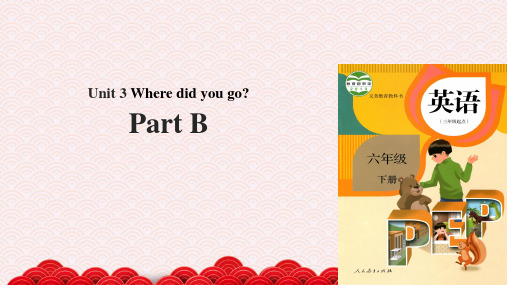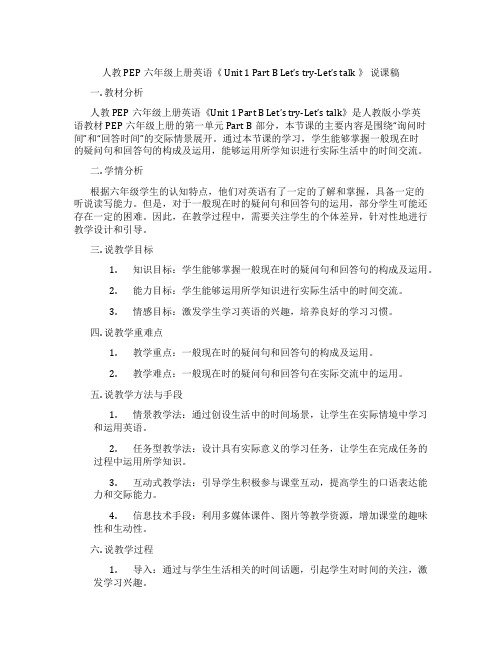人教PEP版六年级英语上册《unit3 Part B Let's try&Let's talk》作业课件(实用)
PEP(人教版) 小学六年级上册英语Unit 2 教学课件 第3课时 B Let's learn

at a red light. at a yellow light. at a green light.
Look and say. Go. Slow down and stop. Stop and wait.
Fast reaction
Stop and wait at a red light. Go at a green light. Slow down and stop at a yellow light.
A.
B.
Lead in
What are these? They are traffic lights.
Lead in
Do you konw what the lights mean?
Mrs Smith and the children are at the crossing now. Where are they going?
traffic rules 交通规则
Stop and wait at a red light. Slow down and stop at a yellow light. Go at a green light.
Read and match
Stop and wait Go
Slow down and stop
祈使句主要用来表达请求、命令、建议、叮嘱 或祝愿等。祈使句通常省略主语(you)。
Do 型 Close the door!
肯定祈使句 Let 型 Let me help you!
祈
Be 型 Be quiet!
使
句
Don't 型 Don't go at a red light!
否定祈使句
No 型 No smoking!
人教版PEP版六年级上册Unit3 My weekend plan A Let's talk

Brainstorm
wash clothes
go ice-skating Activities
draw pictures
make a snowman
go for a picnic
play basketball
Pair work
Talk about your and your friends’ weekend plan.
He is going fishing this afternoon.
Watch and answer 1.What is Mike going to do tomorrow?
He is going to see a flim tomorrow.
2.What is Sarah going to do tomorrow?
What is Chen Jie going to do?
She __is___ g_o_in_g__ _t_o__ __w_a_sh__h_e_r_ _c_lo_t_h_e_s_.
What is Mike going to do?
He __i_s__ _g_o_in_g_ __to__ _d_r_a_w _p_i_ct_u_r_e_s.
B.cleans
C.cleaning
Thank You
moring ,I __a_m_g_o_in_g__to__d_ra_w__p_ic_t_u_re_s______. On Sunday
afternoon,I _a_m_g_o_in_g__to__pl_a_y_f_o_o_tb_a_l_l ____.
What a busy and happy weekend!
OK.__W__h_a_t _a_b_o_u_t _t_h_is__af_t_e_r_no_o_n_?_
新人教版PEP小学六年级上册英语第三单元Unit 3 My weekend plan A Let's talk 教学反思

新人教版PEP小学六年级上册英语第三单元Unit 3 My weekend plan A Let’stalk 教学反思本课教学目标是:1、能听、说、读、写句子:What are you going to do tomorrow? I’m going to have an art lesson .2、能够理解对话大意;能够按照正确的意群及语音、语调朗读对话,并能角色表演。
3、能够在情景中运用句型What are /is …going to do ? I’m going to …He/ She ‘s going to …They are going to …提问及作答。
4、学生能够合理计划自己的活动。
为了完成教学目标,我开展了如下教学活动。
在Warming up部分,我采用了TPR活动复习了学过的词组,并通过与CEO的问答交流学生平时的周末活动,从而引出本单元的新句型What are you going to do this weekend ?这个环节师生配合的很默契。
在Presentation部分,我先让学生听录音,解决Let’s try部分。
第一遍让学生从声音上整体感知,对文本的教学重难点有个预先的了解;第二遍学生们边听边圈出正确答案;第三遍全班核对答案,加深学生的印象。
最后预留了一个问题:What is Mike going to do this afternoon?过渡到本课的主要句型。
我出示课件,让学生依据课件中的词组与同桌结伴交流第二天的计划。
在学习Let’s talk部分时,我仍然是以任务型的方式教学,让学生带着问题看动画回答问题。
但是由于只让学生听一遍就回答问题,难度有点高,以至于积极回答问题的学生不多。
接着让学生跟读录音,有个原汁原味的输入过程,再让他们自己读,他们读得很认真。
在表演展示环节,我先是分组进行,接着让小组上台展示。
我觉得学生的练习比较少,而且形式也不够生动。
在Consolidation and extension部分,我先是让学生根据图片用“be going to”造句,由于一开始老师的师范不到位,学生有点不太理解,造成有点冷场。
六年级下册英语教学课件Unit 3 Part B 人教(PEP)

Sarah: Where did you go over the winter holiday? Amy: My family and I went to Sanya. Wu: Really? Did you like it? Amy: Yes, it was so warm. Sarah: Hainan is far A. from here. How did you go there? each Amy: We went there B. by peach plane. Wu: How was the beach? What did you do there? C.I reach Amy: It was beautiful. took lots of pictures, and I also D. beach went swimming. Sarah: Sounds great! Can I see your pictures sometime? Amy: Sure.
Role play
Make a dialogue with “where, how, what” A: Hello. Where did you go over/in/during _____? B: I went to _____. A: How did you go there? B: We went there by ____. A: What did you do there? B: I ___________________________. A: Sounds great! Word bank time: Labour Day holiday, summer holiday place: Shenzhen , Beijing , London , New York Transportation: by plane, by train, by subway Activities: rode a horse, went swimming, climbed the Great Wall,
人教PEP版六年级英语上册《Unit 2 Part B 第3课时》教学课件PPT小学公开课

Unit 2 Ways to go to schoolPart BLet's try & Let's talkPEP版英语六年级(上)能听、说、认读单词和词组:helmet, must, wear,attention, pay attention to,traffic, traffic lights✔ 能够运用句型…must…和Don’t …表达要遵守的交通规则✔ Learning goalsWarming upLet’s reviewby trainby subwayHow do you go to school?By bike, on foot, I can choose my way.How do you get to the bookstore?By bus, by subway, I can choose my way.How do you get to the sea?By plane, by ship, I can choose my way.Let’s chant图中有几处违反交通规则的行为?Presentation 你还知道哪些关于交通安全的知识呢?Look at the children. What are they doing?Let’s tryWhat does Mrs Smith tell the children todo? Listen and tick.听力原文Mrs Smith: Children, let’s get on the bus!Children: Yeah!Mrs Smith: You should get on one by one.Children: OK.You should get on one by one.let’s get on the bus!逐个地;依次地Listen again and answer.1. Is Wu Binbin coming?2. Why isn’t he coming?No.Because his grandpa is ill.3. What do you learn from the listening?We should get on the bus one by one.Wu Binbin’s grandpa is ill.He is going to the FuxingHospital to visit him. How can he get there?Let’s thinkWatch and answer.1. Who does Wu Binbin meet?2. How can Wu Binbin get to theFuxing Hospital?3. What do you know about riding bikes in the USA?A. B.4. What is right, when you see the red traffic light?A. B.Let’s watch1.Who does Wu Binbin meet?2. How can Wu Binbin get to the Fuxing Hospital?Check the answers.Mr Jones.He can take the No. 57 bus.3. What do you know about riding bikes in the USA?A. B.4. What is right, when you see the red traffic light?A. B.Wu Binbin: Mr Jones, how can I get to the Fuxing Hospital?Mr Jones: Take the No. 57 busover there.Let’s talkLanguage points 可可和妈妈在路上遇到一个外国人问路。
人教PEP六年级上册英语《Unit1PartBLet'stry-Let'stalk》说课稿

人教PEP六年级上册英语《Unit 1 Part B Let’s try-Let’s talk 》说课稿一. 教材分析人教PEP六年级上册英语《Unit 1 Part B Let’s try-Let’s talk》是人教版小学英语教材PEP六年级上册的第一单元Part B部分,本节课的主要内容是围绕“询问时间”和“回答时间”的交际情景展开。
通过本节课的学习,学生能够掌握一般现在时的疑问句和回答句的构成及运用,能够运用所学知识进行实际生活中的时间交流。
二. 学情分析根据六年级学生的认知特点,他们对英语有了一定的了解和掌握,具备一定的听说读写能力。
但是,对于一般现在时的疑问句和回答句的运用,部分学生可能还存在一定的困难。
因此,在教学过程中,需要关注学生的个体差异,针对性地进行教学设计和引导。
三. 说教学目标1.知识目标:学生能够掌握一般现在时的疑问句和回答句的构成及运用。
2.能力目标:学生能够运用所学知识进行实际生活中的时间交流。
3.情感目标:激发学生学习英语的兴趣,培养良好的学习习惯。
四. 说教学重难点1.教学重点:一般现在时的疑问句和回答句的构成及运用。
2.教学难点:一般现在时的疑问句和回答句在实际交流中的运用。
五. 说教学方法与手段1.情景教学法:通过创设生活中的时间场景,让学生在实际情境中学习和运用英语。
2.任务型教学法:设计具有实际意义的学习任务,让学生在完成任务的过程中运用所学知识。
3.互动式教学法:引导学生积极参与课堂互动,提高学生的口语表达能力和交际能力。
4.信息技术手段:利用多媒体课件、图片等教学资源,增加课堂的趣味性和生动性。
六. 说教学过程1.导入:通过与学生生活相关的时间话题,引起学生对时间的关注,激发学习兴趣。
2.呈现:展示一般现在时的疑问句和回答句的图片,引导学生观察和理解。
3.操练:让学生分组进行角色扮演,模拟实际生活中的时间交流情景,巩固所学知识。
4.实践:设计具有实际意义的时间任务,让学生在完成任务的过程中运用所学知识。
人教版英语六年级下册《第三课时Part B(Let’s try--Let’s talk)》教学课件
A. Did;do
B. Do;do
C. Do;did
3. — Who __C__my desk ?
— Perhaps Tom did.
A. clean
B. cleans
C. cleaned
Please answer the questions. 1. Chen Jie _________(clean) the room last weekend. 2. Wu Yifan _________ (watch) TV last weekend. 3. Sarah _________ (do) homework last weekend. 4. John ___________(wash) clothes last weekend.
magazine [ˌmæɡəˈziːn] 杂志
better [ˈbetə(r)] (well的比较级)更好的 faster [ˈfɑːstə] (fast的比较级)更快的
Read the conversation again and answer the questions.
一般过去式的疑问句及否定形式
A:Did you visit a friend last Sunday? B: __N_o_,_I_d_i_d_n_’_t._I__s_ta_y_e_d__a_t_h_o_m__e_. ___.
2.一般过去式的特殊疑问句结构
特殊疑问词+助动词过去式+主语+V.动词原形
What
When Where
课堂小结
快来说说这节课你有 什么收获?
课堂总结
本节课我们主要学习了哪些 内容?你有什么收获?大胆地说 说自己的体会、感受或想法。
2023年PEP版六年级英语上册Unit 2 Part B 第3课时 (2)
Mr Jones: Hey, don’t go at the red light! Wu Binbin: Oh, right! Thanks. I must pay
attention to the traffic lights!
Look and guess
What are the children doing? They are crossing the road one by one.
一个接一个地
What are the children doing? They are getting on the bus one by one.
Look and predict
Wu Binbin is going to the Fuxing Hospital. But he doesn’t know the way. Whom does he ask? How can he get there? Can you guess?
Watch and answer
Don’t turn right. You can see this at a crossroads.
Don’t touch the door. You can see this in the subway.
Different kinds of signs
We must obey traffic rules!
bikes! Mr JSA.
PWauy Baitntbeinn:tioWnhtaot’sthtehisp?ronunciation and the intonation.
人教版六年级英语上册Unit4 第三课时Let’s try
Let’s talk
John: Hey, Yifan. What are you doing? Wu yifan: I’m writing an email to my
new pen pal in Australia. John: Does he live in Sydney? Wu yifan: No, he doesn’t. He lives in Canberra.
例句:—Does your mother go to work by bus? 你妈妈乘公共汽车去上班吗?
—Yes, she does. 是的。
典例 ___B___your brother ______a book?
A. Does;has
B. Does;have
C. Do;have
点拨:此句是考查一般现在时的一般疑问句,应用助 动词do或does。由于your brother是第三人称 单数,需用助动词does,助动词后用动词原形。
二、根据情景选择填空。
1. —I have the same hobby as you.
—____B____ A.Oh,no! B.Amazing! C.Good idea. 点拨:情景为:我和你有相同的爱好。A是“哦,
不”的意思;B是“令人惊奇的”的意思; C是“好主意”的意思。故选B。
三、用interesting或interested填空。 1. I’m very __i_n_te_r_e_s_te_d__ in this movie.
pen pal? Wu Yifan: Sure. Why not? John: Cool!
Let’s talk
知识点 1 —Does he live in Sydney?他住在悉尼吗? —No, he doesn’t. 不,他不是。
